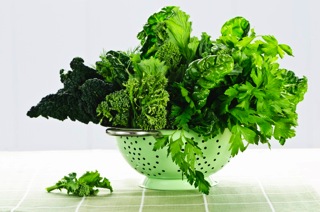
Memory loss and dementia are valid concerns for everyone these days: one in three seniors dies of Alzheimer’s or dementia and Alzheimer’s is the sixth leading cause of death in the United States. Fortunately, dementia is largely preventable with many lifestyle and dietary adjustments, one of which is including plenty of greens in your diet.
New research shows eating plenty of spinach, kale, collards, and mustard greens can help slow cognitive decline. Researchers believe the high vitamin K content in these vegetables plays a role in preserving brain health.
The study tracked almost 1,000 older adults during five years and saw significantly less cognitive decline in participants who ate leafy green vegetables.
In fact, the elders who ate one to two servings a day of leafy greens had the cognitive ability of someone 11 years younger.
Researchers credited not only the vitamin K in leafy greens for slowing cognitive decline, but also lutein and beta-carotene. Other brightly colored fruits and vegetables are also high in these vitamins.
Vitamins aren’t the only brain benefits of leafy greens — greens promote healthy gut bacteria
The vitamins in leafy greens aren’t their only benefits.
For one, leafy greens are also rich in fiber, which are good for the gut. Plenty of dietary fiber not only prevents constipation, but it also supports the healthy bacteria in your gut. People who eat diets high in plant fiber show a more beneficial composition of gut bacteria compared to those who eat a typical western diet.
Scientists have increasingly been discovering how vital beneficial gut bacteria are to brain health. For instance, healthy gut bacteria promote the integrity of the blood-brain barrier, the lining that protects the brain.
Gut bacteria have also been shown to influence depression, anxiety, learning, and memory. This is because the gut and the brain communicate closely with one another through the vagus nerve, a large nerve that runs between the brain and the organs.
Eating greens is usually part of a healthy brain lifestyle
Another factor to consider with this study is that people who eat greens every day are typically more conscious of their health. Someone who is taking the time to shop for and prepare greens every day is probably eating a healthier, whole foods diet and avoiding dementia-promoting junk foods, sodas, and sugars.
Exercise is the golden bullet to lasting brain health
People who eat healthier also tend to exercise more regularly, whether it’s just taking a daily walk or hitting the gym every day. Both strength training and aerobic exercise have been shown protect neuron health, ensure better blood flow to the brain, and protect the brain from the damaging proteins that cause Alzheimer’s.
One study that followed more than 600 people ages 70 and older found those who engaged in the most physical activity showed the least amount of brain shrinkage.
Another study found that older adults who walked as little as 30 to 45 minutes three days a week increased the volume of the part of the brain responsible for learning and memory.
So although eating your greens is a great way to boost brain health (and gut health), if you eat your greens AND exercise every day, you drastically reduce your chances of developing dementia and Alzheimer’s. Considering there is no cure for dementia and Alzheimer’s — the neurons that die in these conditions cannot be recovered — the best approach is a preventive one.
Ask my office for more details on lowering your risk of dementia and Alzheimer’s.



Latest from the Blog
The Death of Red Dye #3
January 15, 2025What Is Red Dye No. 3? Red Dye No. 3, or Erythrosine, is a synthetic food color derived from coal tar. It was first approved by the FDA in the 1950s and quickly became one of the most popular artificial colors in food and cosmetics. Red Dye No. 3 was used in everything from candies, […] Read more
Latest from the Blog
Do You Know What Is In Your Protein Powder?
What’s Really in Your Protein Powder? Understanding the Risks Protein powders are a staple in many health-conscious diets, from athletes seeking muscle recovery to those simply aiming to boost their daily protein intake. With a wide variety of options available, choosing the right one can feel overwhelming. However, recent findings have raised concerns about what’s […] Read more